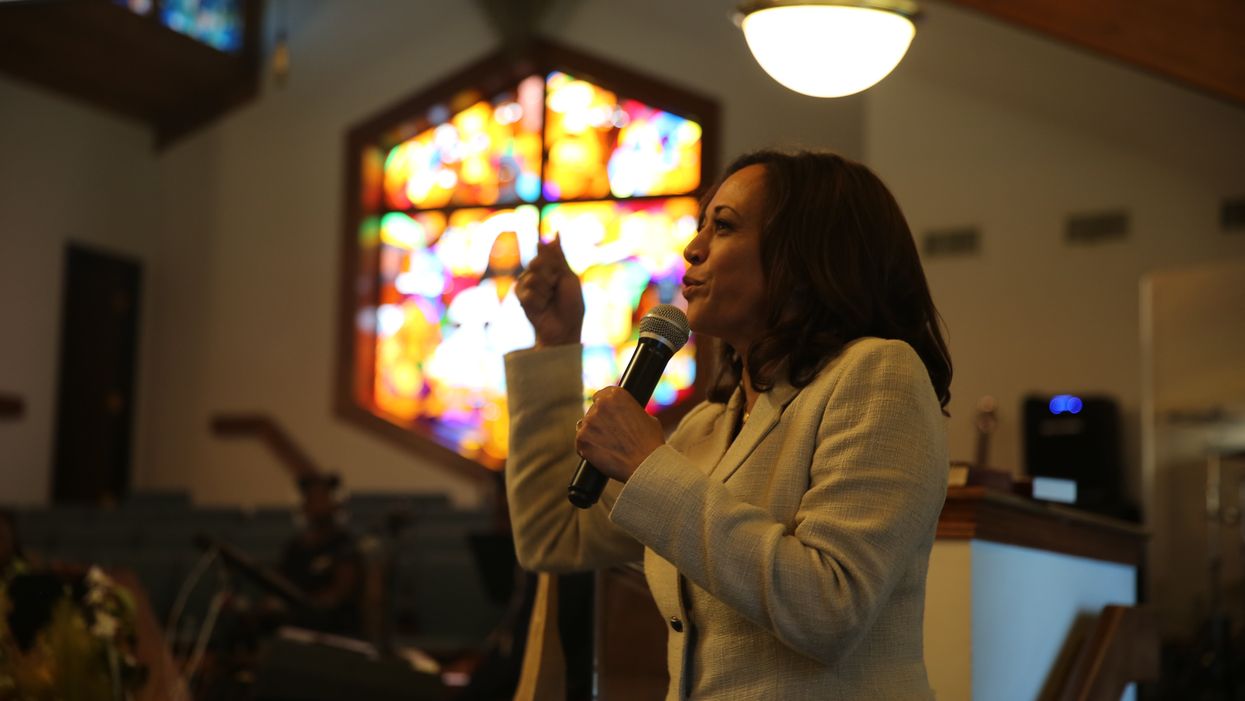
Photo by Sean Ryan

Preach
The 11:00 a.m. Sunday service at Corinthian Baptist Church was a little more crowded than usual.
Not much.
It was the same half-empty room as always, same congregants, in their dayglow blouses and deacon greys.
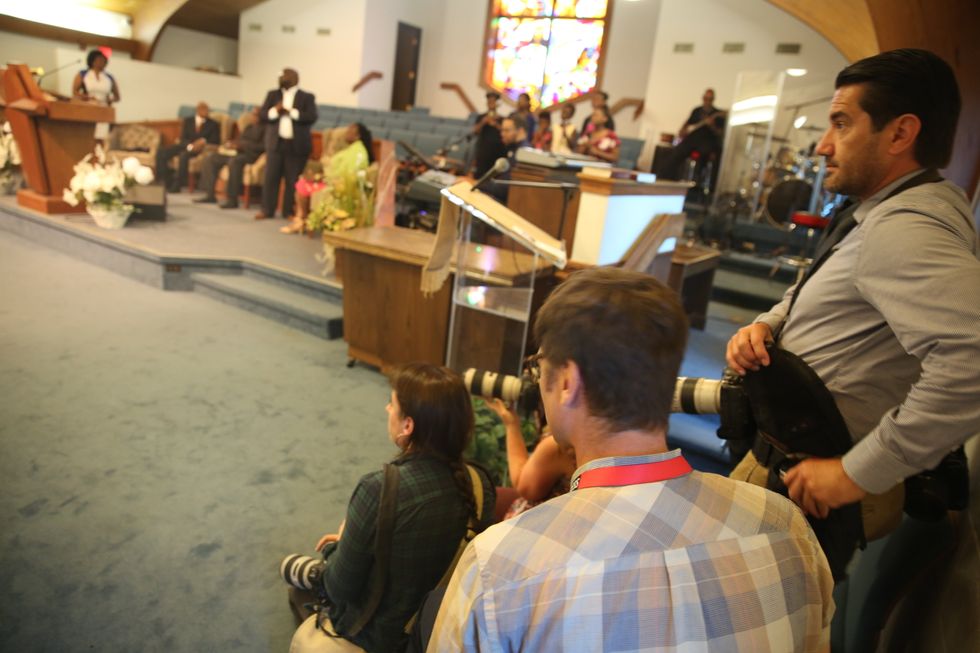
Only, that Sunday, a dozen-odd journalists and photographers lurked the pews, angling for a glimpse of Kamala Harris as she sat with good posture in the front near the pulpit.
Counting Harris, her sister, and her securty — wherever they were — the church was about 18 people more crowded than usual, and that was everything.
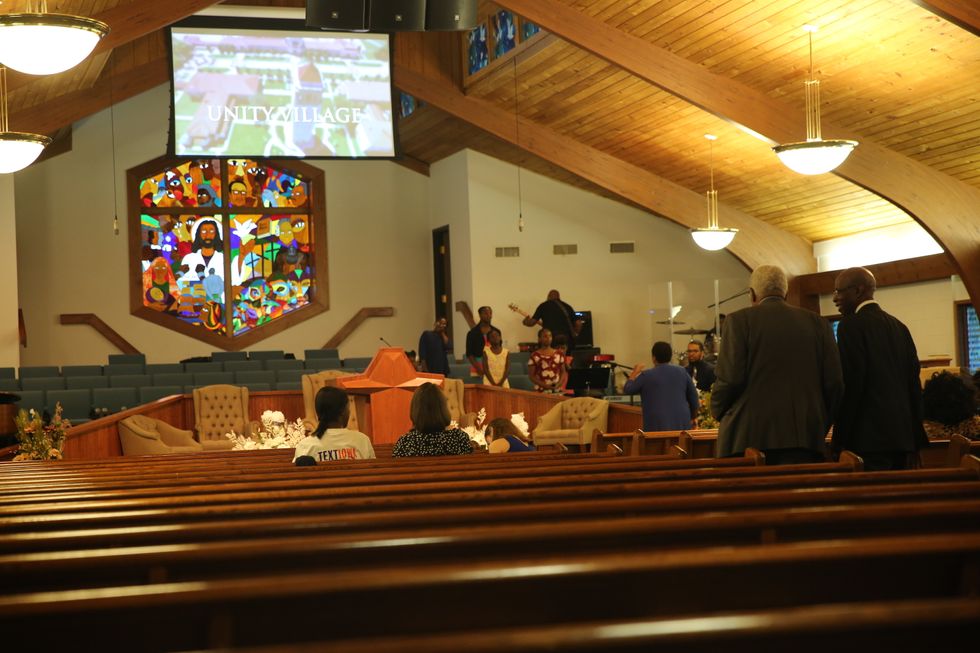
Harris often speaks at churches. Growing up, she went to a black Baptist church, 23rd-Avenue Church of God in Oakland, California. She and her sister Maya sang in the choir. Other days, they attended temple with their mother, a breast cancer researcher from the Brahman Caste, the highest level of Indian society and domain of Hindu priests and supreme beings.
*
Who knew that Kamala Harris would slowly torch herself and begin an inevitable decline into Bidenisms and choked laughter, as, somehow, she started transforming into Biden 2 right before our eyes?
Not many in Iowa.
There was a real fervor in the air, centered on Harris. She was everywhere. She looked unstoppable.
The lesson was, politics has the agility of a game, and nobody — no one — ever truly knows who will win.
*
Light environed Harris as she strode to the clear-plastic podium at the side of the stage.
Tendrils of stained-glass light all around her, green and yellow and red and white and purple, all writhing in bright shifting dayglow, with a black Jesus surrounded by people of every color, three glinting crucifixes over his shoulder.
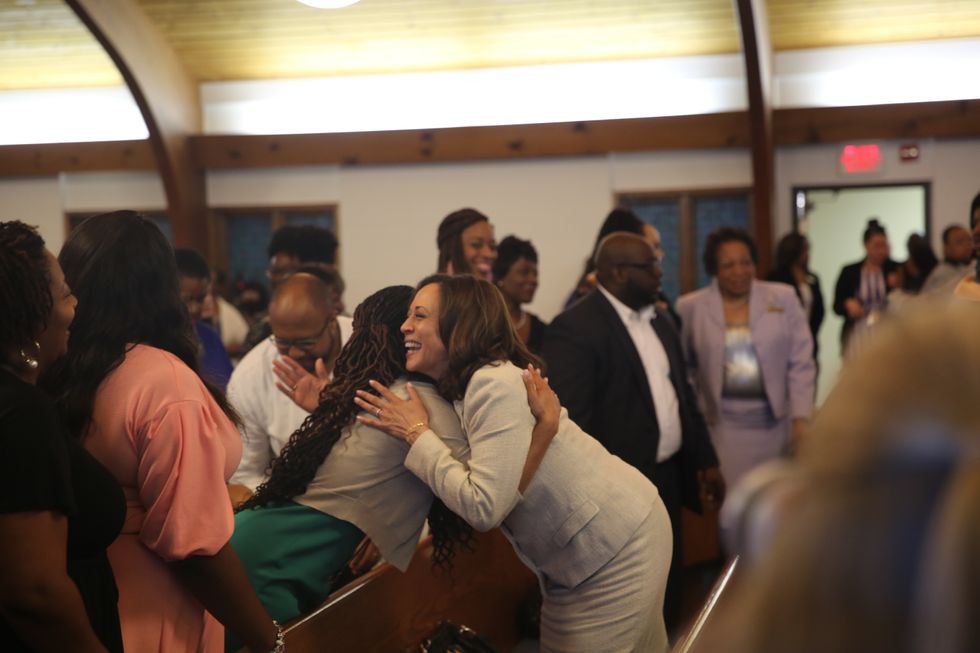
"It is the church where we go, in times of need," she said, pausing so that the phrase could hum and the congregation could agree.
"Yes," they shouted. "Yes, Lord."
"It is the church where we go, when we need upliftment. It is the church where we go, when we need inspiration. It is the church where we go, when times like these test our faith and we need to be reminded of all of Christ's teachings, and what Jesus has taught us," she continued.
"Hallelujah," someone shouted.
"And we will fight evil, when it appears. Like what we're talking about this week, what we saw in El Paso and Dayton. We talked about the hate that displayed itself, that took on lethal proportions, and, as we all know, Lord, if we ever needed you, we need you at a time like now," Harris preached.
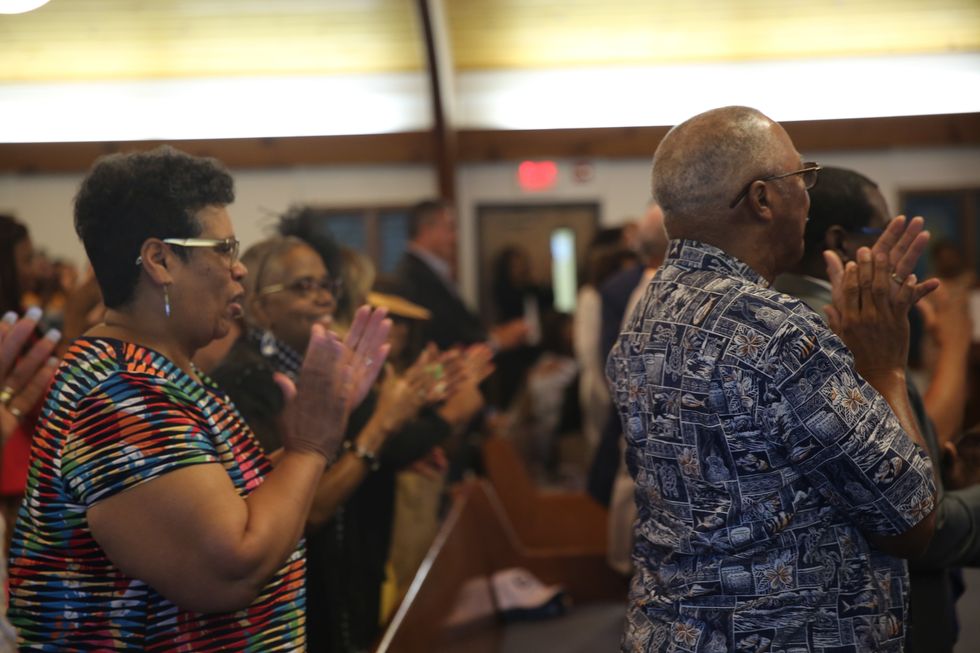
The congregation clapped wildly, churning out spastic cries.
"But we also know in Romans, 'Do not be overcome by evil, but overcome evil with good.' So this is one of these moments," she said, adding that she and her sister Maya grew up in a home of faith. She repeated the word "faith." Then she waved toward Maya, who sat upright, looking ahead in her all white-outfit, contemplative, awake, like a Renaissance painting of an angel.
"We were raised to understand that we must live our faith. We were raised to understand that your faith, you should think of it as a verb."
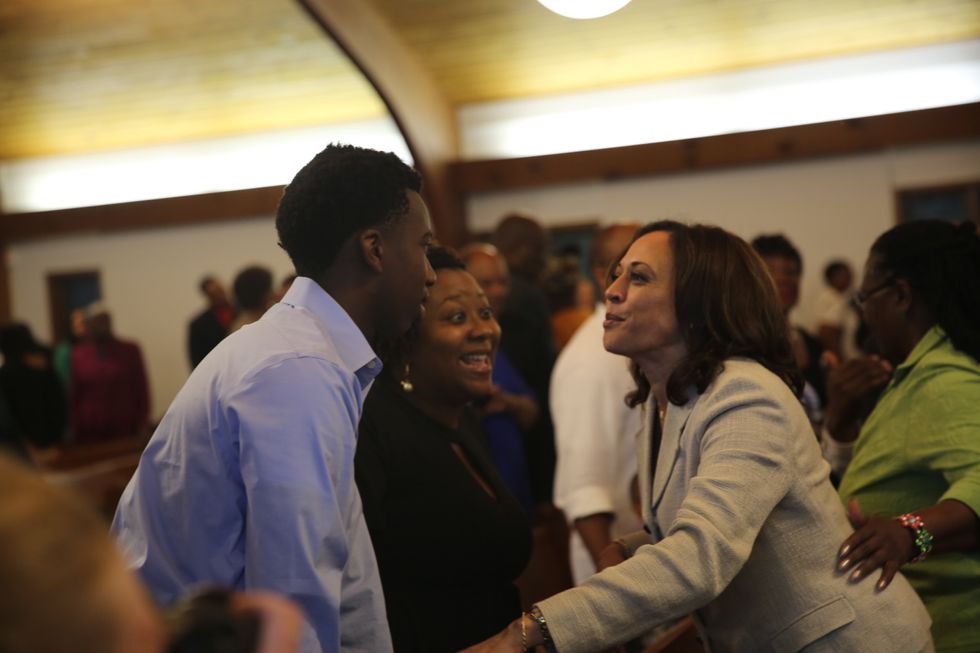
"All right!" shouted a woman in a pastel red dress. "Live it!" shouted her neighbor.
"Faith is going to be displayed, not just in your words, but in your actions. And when I think about moments like this, I think we all know this is an affliction in the history of our country. This is a moment of time that is challenging us to look in a mirror and ask a question. That question being, 'Who are we?'"
A chorus of "mm-hm"s, instinctive agreement.
"At church, I think we know part of the answer to that question is 'We. Are better. Than. This.'"
"Oh, now," said the congregation. "Better, better, better than this."
"So this is a moment in time that requires us to fight. For the best of who we are. And fight we will," Harris said.
"Amen. "Hallelujah." "Go on."
"You know, my sister and I, we were raised by a family of fighters. My parents met when they were active in the Civil Rights movement in Oakland in the 1960s. We joke that we grew up surrounded by adults who spent full-time marching and shouting. About this thing called justice."
Laughter, laughter, then a fulsome "Right on!"
"And the heroes included not only Dr. King, who by the way was in his early 20s when he led the boycott — he, together with John Lewis and so many others, they were youth when they were driving and running that movement — but those heroes, including Thurgood Marshall and Charles Hamilton Houston and Constance Baker Motley, who understood the skill of the profession of law and transferred the passion from the streets to the courtrooms of our country, to do the work of reminding folks of that promise that we articulated in 1776, that we are all equal, and we need to be treated that way."
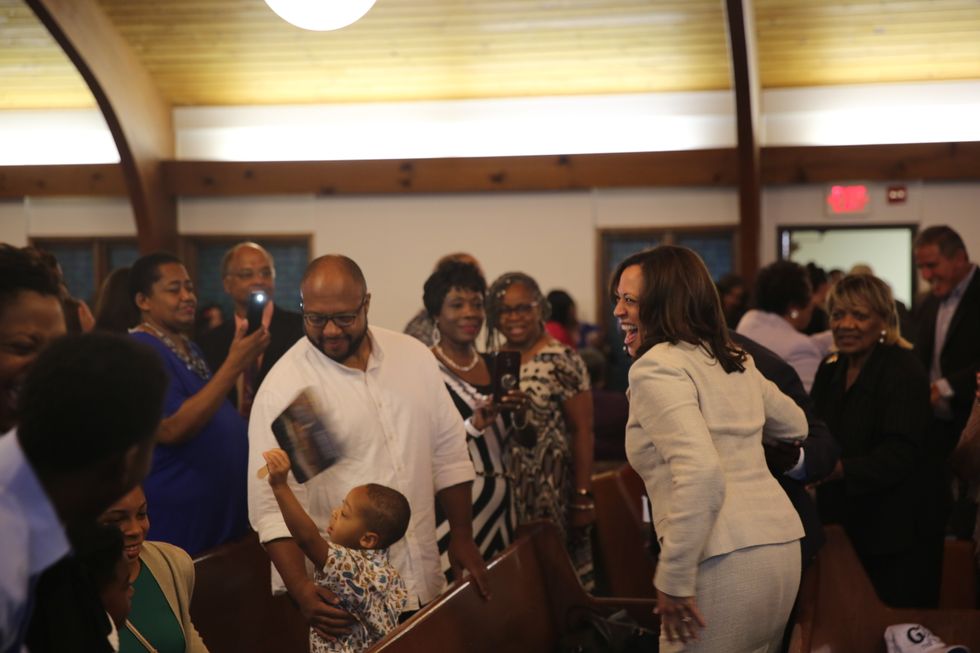
"Go ahead."
"That's why I went to Howard, went to law school, and decided to do the work that I've done, believing that one of the ways we will live our faith is to fight for justice."
"Whoop!"
"Scripture tells us, 'We must shine a light on the path, toward justice.' And so this is one of those moments in time where our faith is being challenged. And we must fall back on all of Christ's teachings, to remind us of what we are capable of."
Silence.
"One of my favorite parables is the story of the good Samaritan. When we talk about the good Samaritan, when Jesus talks about it, he challenges us to define 'neighbor.'"
"Mm-hm." In coordinated murmurs. "Yes, yes mm-hm."
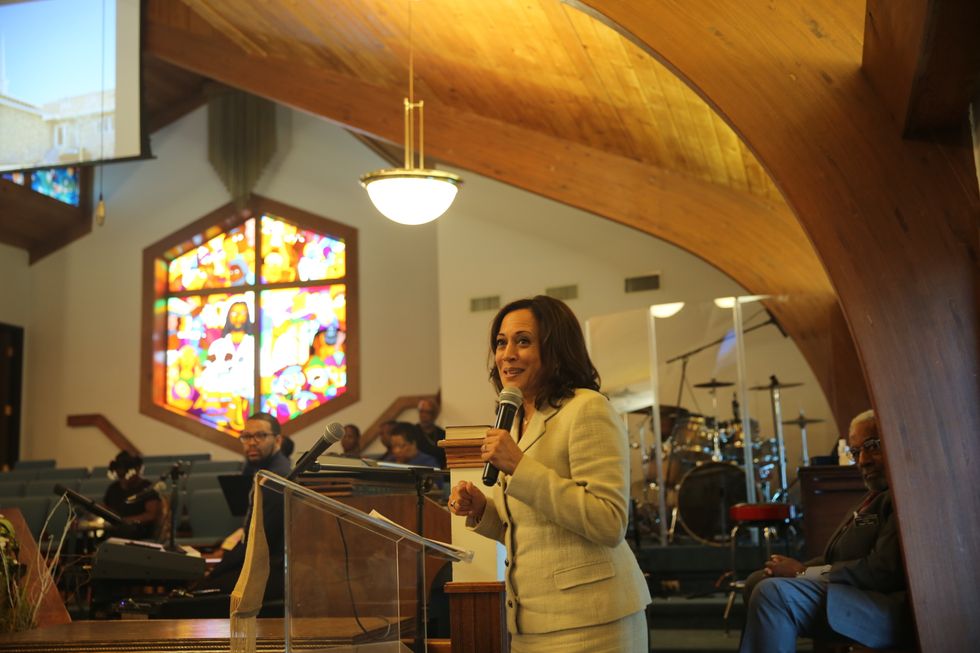
"So the Commandments tell us to love each other as we would our neighbor. But let's challenge ourselves to define 'neighbor.' The parable of the good Samaritan tells us, 'Well you may think your neighbor is just someone who lives next door to you. Drives the same kind of car as you. Has kids who go to the same school as your kids. Same zip code as you.' But, no."
"No, no." "Yes, yes." "Mm-hm."
"Your neighbor includes when you're walking down the street and you see that person by the side of the road, in need of comfort. They may be drug-addicted, they may have fled harm in a country that is one of the murder capitals of the world, they may be out-of-work and in need of support. Jesus tells us, 'That is our neighbor, too.' And it is incumbent on us, if we are going to live our faith, to stand with and give dignity to that person."
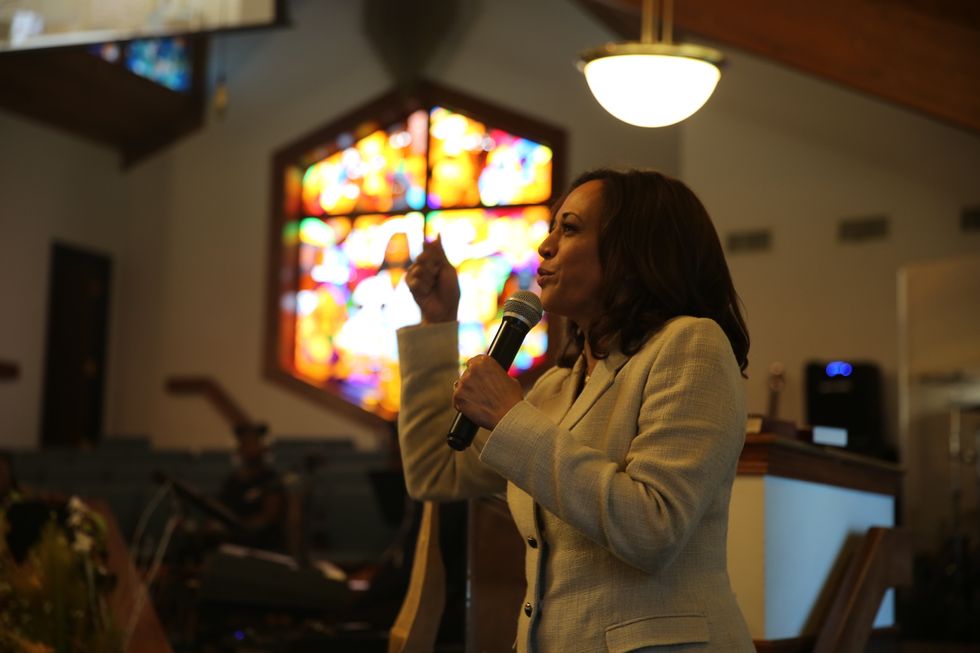
"Amen." "Amen." "Amen."
"To give them support and to lift them up, and to speak out against hate and all that has driven them to be all that they are, and to stand with them."
"Yep!" "Stand with them!"
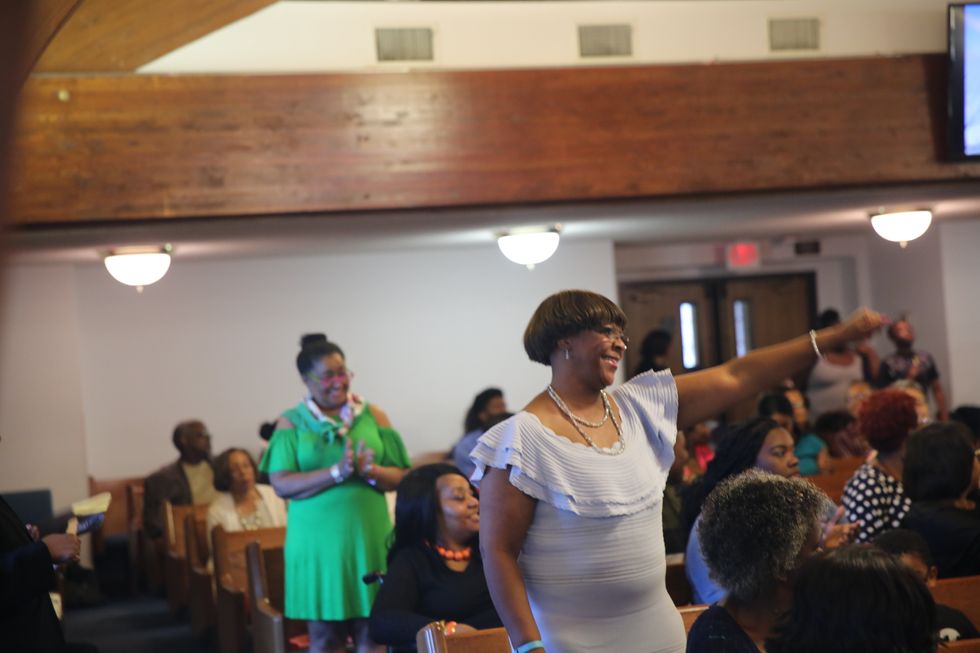
"So it is so wonderful to worship with you this morning. Now, I am here to worship. I am not here to preach, I'll leave that to the pastor. But I do wanna say, as a member of the United States Senate, and as you all know I am running to become the next president of the United States—"
Uproar, uproar, yips and whoo's, loads of clapping, a whistle or two.
"—let our faith guide us, at moments like this. And guide us in a way that also lets us know that, as history has always proven to us, if we have faith to see what can be, unburdened by what has been, we will move mountains."
In the stale room that smelled like old closet, a wave of voices surged toward Harris, and she let it all wash over her, three glinting crucifixes over her shoulder.
*
A couple weeks earlier, Harris wound up on the same D.C.-to-Detroit flight as conservative firebrand and borderline troll Candace Owens. At the airport, Owens did what Owens does best. She grilled. She prodded. She spoke fast and had an answer for anything.
She even photobombed.
Owens has been viciously critical of Harris, scathing.
Like Harris, she is a natural performer.
At the Conservative Political Action Conference in March, Owens said that Harris thinks that "black people are stupid."
In the past few years, Owens has catapulted to political stardom. For a while there, she was close with Kanye West. And most of us assume that she'll make a run for president herself at some point.
I had seen her in Dallas that April, three months earlier, at a Blexit rally, on the eve of her 30th birthday.
At both sides of the room, bartenders glared and muttered and slouched into cash registers. Onstage, people prayed over Owens and called her the Martin Luther King of our time, then balloons scattered down over a mostly Caucasian crowd in a mostly unpeopled ballroom, red-tipped by MAGA hats. Then she marched around to "Jesus Walks," the song that will keep Kanye West out of Hell.
*
Kamala Harris began her 2020 campaign on Jan. 21, Martin Luther King Jr. Day, at a rally in Oakland.
"People in power are trying to convince us that the villain in our American story is each other," she told the crowd of 20,000. "But that is not our story. That is not who we are. That is not our America."
As much as Owens dislikes her, Harris is paving the way for black women in politics.
Many of Harris' anecdotes are sayings from her mother. A favorite goes something like, "My mother always told me, 'Be the first to do many things. But don't be the last.'"
*
Lopsided, broke, unsalvageable. The cold cinder of the news cycle playing out in a church in a busy neighborhood under a highway.
Earlier that morning, several journalists and photographers had slumped off the Hawkeye Stages bus designated for Harris' press, but not many. My dad and I were two of fewer than 10 white people in the room, all but one journalists.
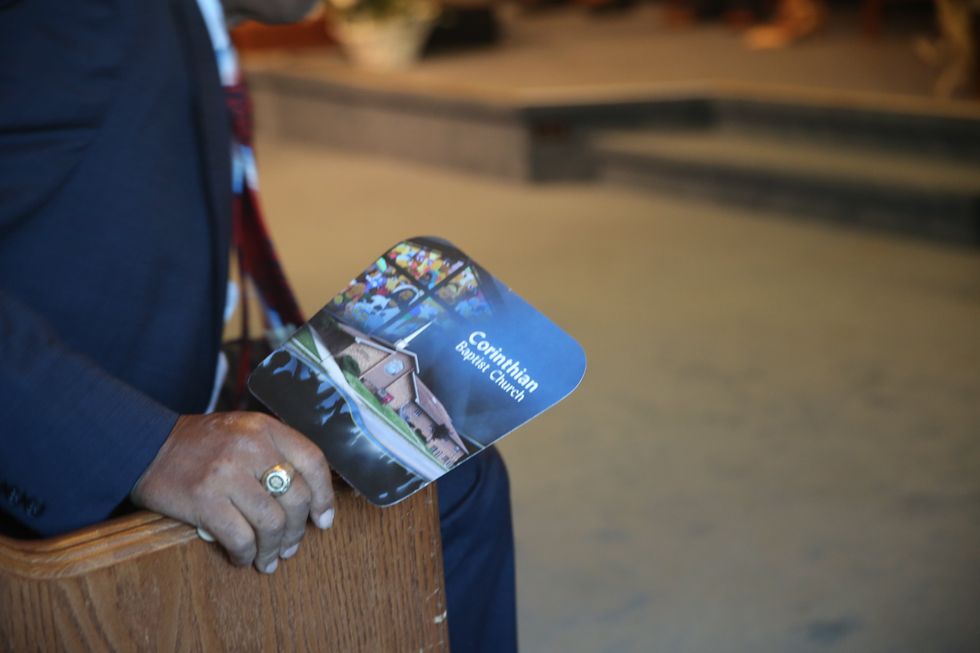
The service had different stages. Sing for a bit, standing. Listen to a hymn, seated. Then a song. Then a sermon.
Now was song.
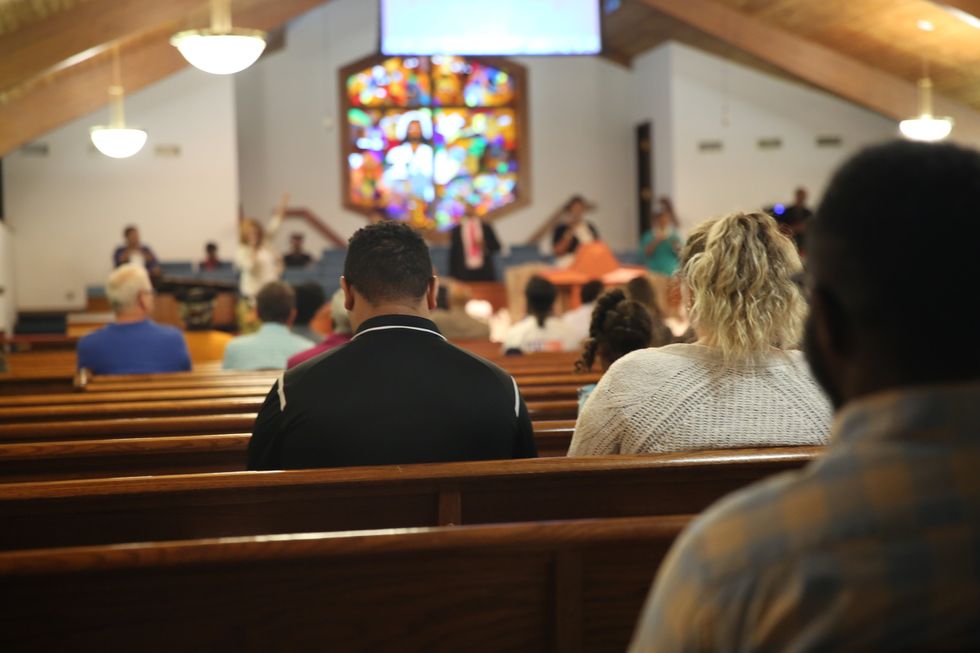
On the screen, lyrics for "God's Gifted Voices."
The program's daily devotional concluded: "Corinithian opens wide her door, And says in the name of Jesus our Lord … WELCOME."
Maybe there was a shift in the air, but something jolted the place with a vague desperation. It shook the winds of the church, past the voice of the perceivable. Nobody seemed to care. Maybe it was the air conditioner.
The half-choir sang, "That's my heart, full of praise."
The band was having fun. They gave stage to the Holy Spirit. Piano, drums, 5-string bass. They were performing with the bounce of Funkadelic, the religiosity of Chance the Rapper, the confidence of David Bowie.
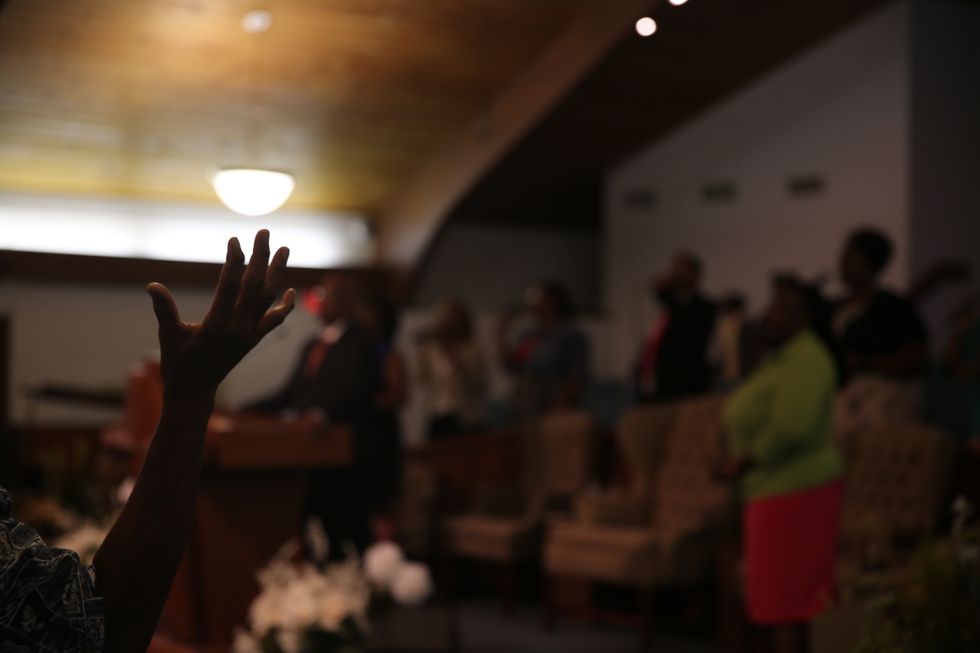
Quotations scattered the back of the church program.
Matthew 11:28. "Come to me, all you who are weary and burdened, and I will give you rest."
Under the section labeled Prayer Ministry, 1 Chronicles 16:11. "Look to the Lord and his strength; seek his face always."
From somewhere, someone cried out, asking "Whose attention are you seeking?"
Then the congregation joined in, "Everywhere I go, I'm gonna let it shine."
Church services always have those awkward hand-offs between one speaker or one event and the next.
An elderly man in a rain-burnished blazer took the stage, leaned into the microphone, and began hurling his gravel voice around.
It spun and spun, until it cut into a ruthlessly powerful version of "Amazing Grace." The man sang like everything was at stake. He ignored almost everyone.
I stood and sang. You would have to. Only a monster would have avoided crying. Not too much just a little.
"By and by, when the morning comes."
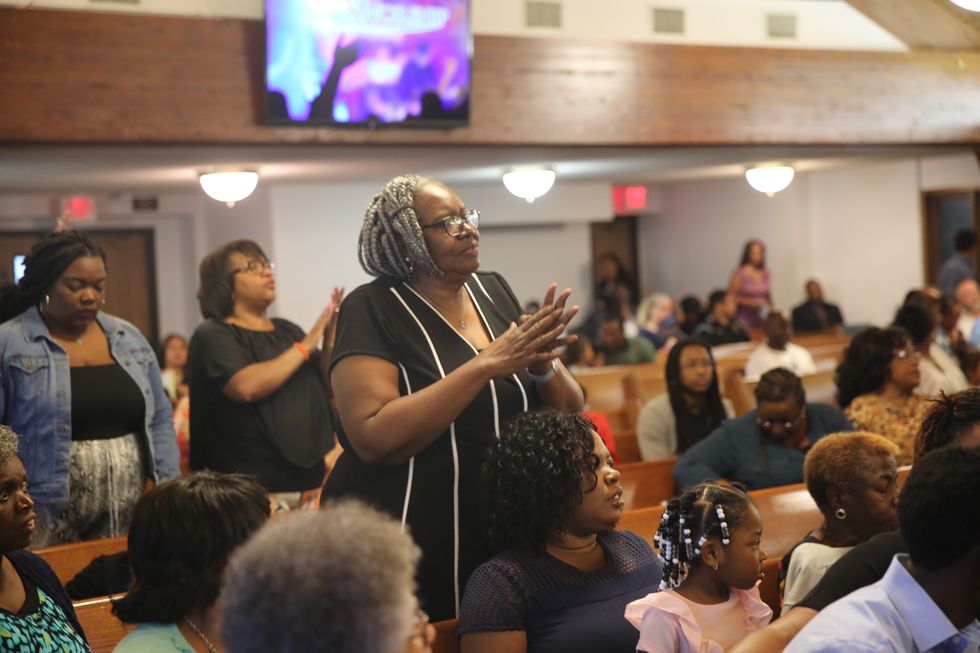
Between songs, someone advised, "Father stretch your hand, the way we sing when we're alone."
A multiplying spirit had overtaken the air. It was the opposite of suction energy, or at least quite different. If suction energy draws the entire room toward one person, this energy expanded each person toward the shore. It brought together instead of pulling in or rending apart. It overcame the indifferent softness of each person's selfhood and mesmerized us into a luminary belch of one thing, one life.
But the spirit receded when the song collapsed, stumbling into a tanglement of drums and bass wimpers. For no reason at all, the keyboard player soloed into the Mario underground level song. Dun-dun dun-dun Dun-dun. I kept expecting the "ping" sound of a coin, which, coincidentally, the collection plates were being passed around.
"Ping!"
Everyone there, we were no longer some dove in a swell of light, we were were a contagion, caught in the web of better manners, like Adam and Eve ashamed of their love handles. Stuck together like so much rice packed into licks of seaweed.
We felt like a shifting tide, sometimes perfect, sometimes ugly.
Then a tiny procession of girls took the stage. Six, barely more than 10 or 11 years old, falsely stern in their Sunday outfits beside rows of empty blue chairs. All of it was so empty.
It was the second Sunday of August and the children's choir sings on the second Sunday of every month. So here they were, singing.
They began sheepishly. They were scared, crowding around a shadow. One girl held her own microphone. She was the leader.
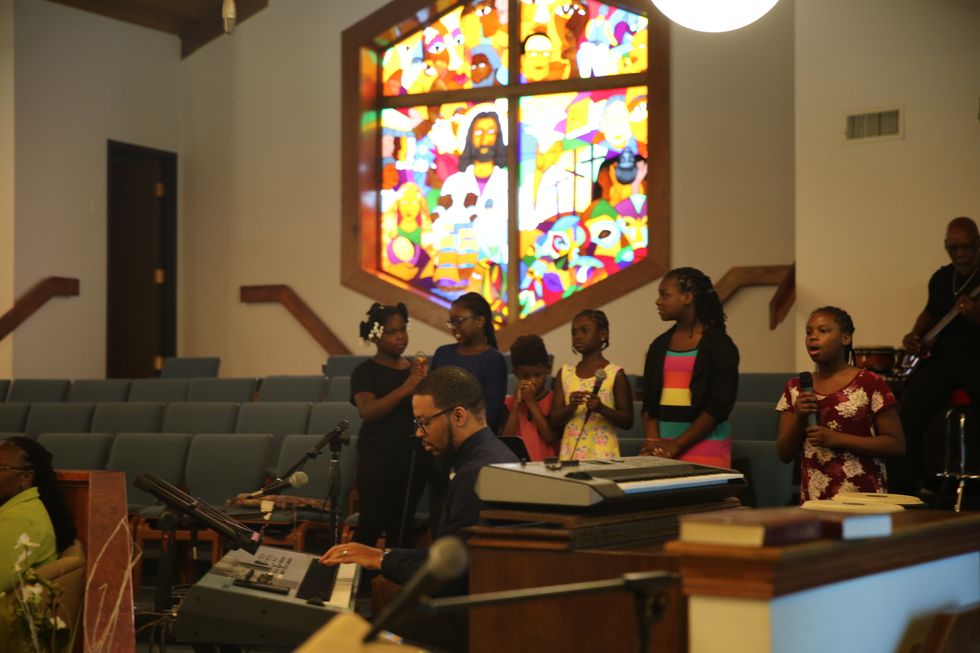
She sang the loudest. She had a ponytail. She wore a red dress with white flowers.
"Sing babies," shouted people in the pews, "yes, yes sing, babies."
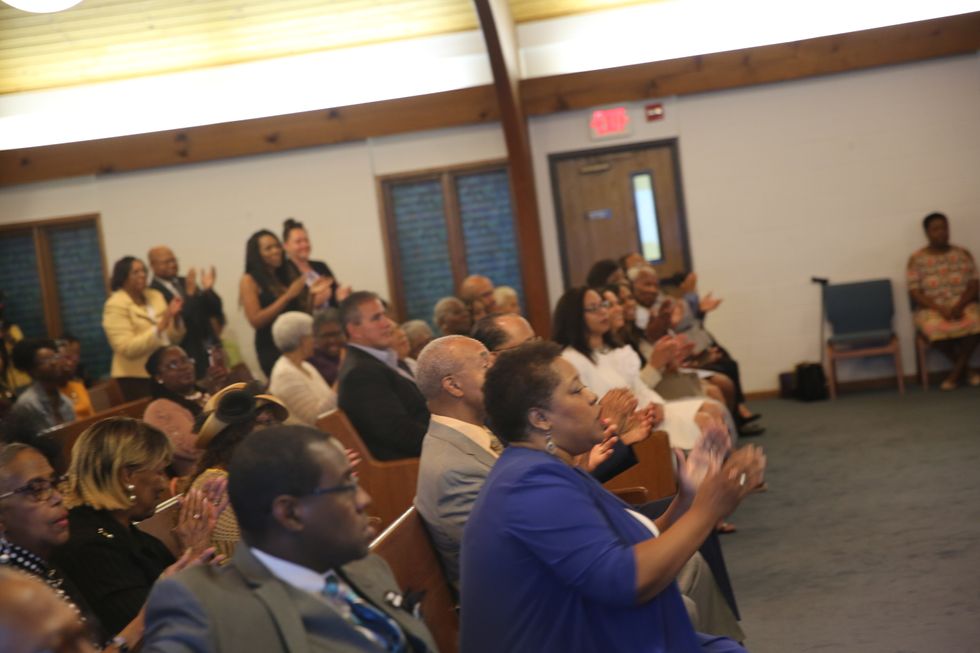
The girls sang "Sunday Morning Heroes," a song I thought I knew but have been unable to find anywhere.
Their confidence grew and their voices got louder. And people cried out.
They repeated what sounded like "You didn't stay too long."
Harris nodded and smiled and positively glowed as she sat front row in a tan blazer.
After the girls finished and people squatted back down into their pews, a deacon said a prayer.
It bore the first mention of politics. Clumsy, the way he stumbled into policy. And, for the first time that morning, you could hear the outside world, police sirens braying past, maybe close, maybe far.
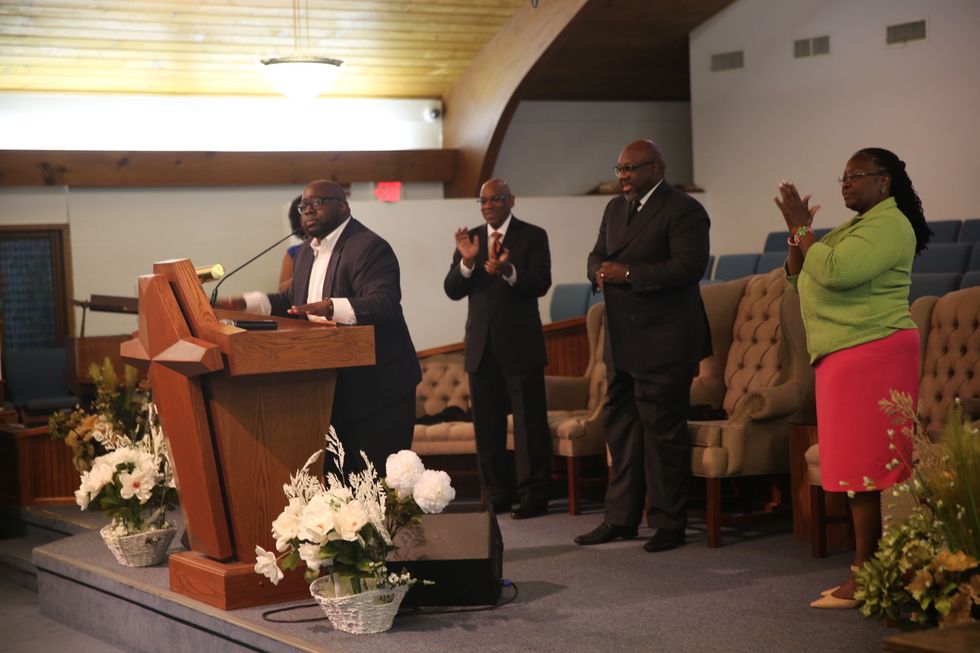
And the weather, all morning a lurking rain and mist held to the air. Fog so thick you couldn't see the speed-limit signs, which means you have to drive slower than whatever number is on them.
The weather wouldn't change much by the end of the service. But it would be a little bit brighter, as all the stained glass cars spat through the residue of a downpour along Interstate 235.
Hop hop hop to a Koji Kondo "Mario Bros." soundtrack.
*
Harris' sister Maya glided down the rows. She stalked along the aisle. Then she locked into the rostrum and spoke.
It was the best speech of the entire week.
Then, she sang.
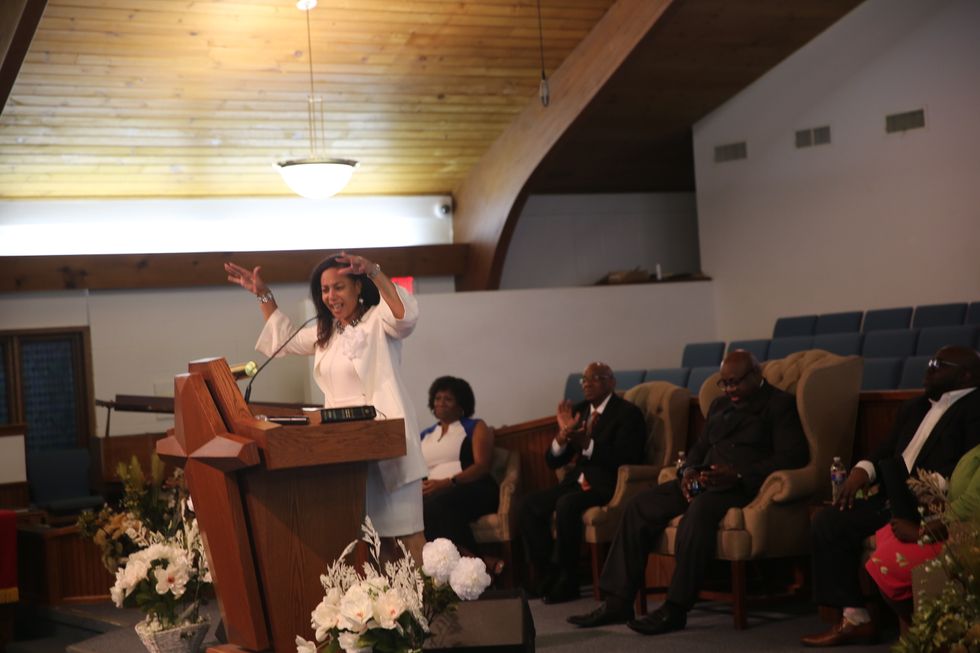
By God, it was fabulous. Scorching. Was this what it felt like to see Aretha back in the day? To watch Sam Cooke sing "Change Gonna Come"? To hear Björk or Chaka Khan in person?
Maya Harris is two years younger than Kamala. She officiated Kamala's wedding in 2014. She chairs Harris' campaign and was a policy advisor to Hillary Clinton's 2016 presidential campaign. Her husband, Tony West, served as associate attorney general under Obama.
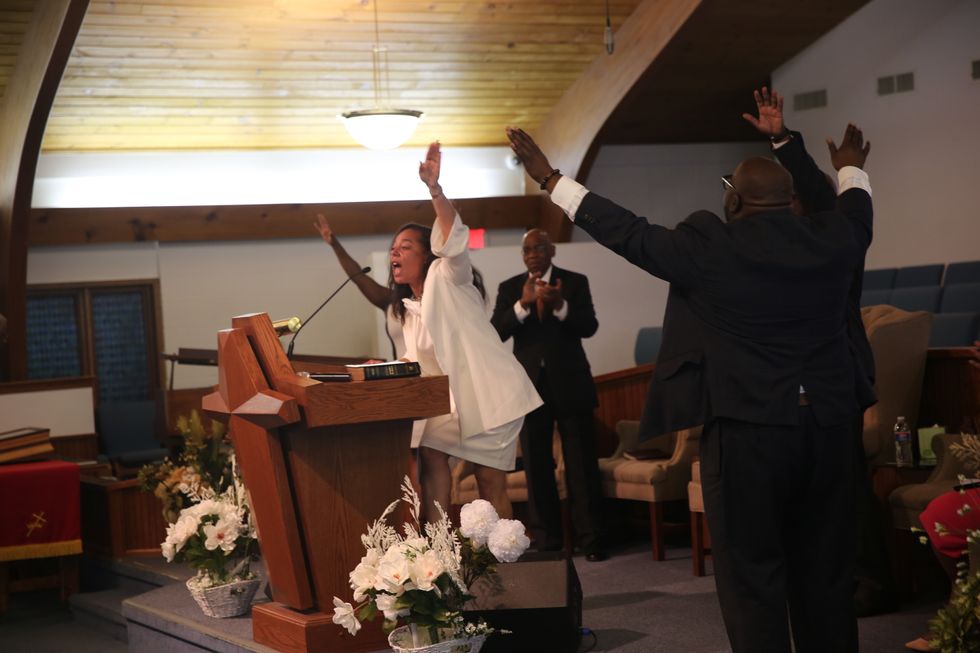
The band fumbled boredly. A woman in a green sweater sat down at the drums.
Maya sang like everything depended on it in the old-room heat. Below the sundance of ocean-bright reflections from the stained glass window. The emotional force of her delivery kept the congregation waiting for whatever came next. And how she started low and quiet then let the song lift her and lift her and lift her and lift everyone, by God, I found myself yipping and going "yes, yes" like the rest of the congregation.
It was the wrong to ask but, anywhere you looked all you saw was the stained glass window, and did Jesus really look like that, like Superfly surrounded by feathers?
*
"Kamala" means "lotus" or "pale red" in Sanskrit. It is also another name for Lakshmi, the Hindu goddess of prosperity, fortune, and beauty.
In Buddhism, the lotus flower symbolizes purity of word and body. There was a trail of lotuses behind every step Siddhartha Gautama Buddha took.
According to Hindu belief, our soul resides in the heart of the lotus, the flower of awakening, of spiritual enlightenment.
The lotus appears throughout Hindu texts as a symbol of divinity. Growth, purity, genesis. The pink lotus is a pendant of the gods. Brahma, the god of creation, was self-born from a lotus flower. He emerged from the navel of Vishnu on lotus petals at the beginning of Time.
*
After the collection plates traversed the last row, the pastor said a word. Some word that all of us know.
He gripped his pulpit. He started with a whisper. Barely audible, quoting Psalms 85:
Restore us again, God our Savior, and put away your displeasure toward us.Will you be angry with us forever? Will you prolong your anger through all generations? Will you not revive us again, that your people may rejoice in you? Show us your unfailing love, Lord, and grant us your salvation.
When someone starts out that quiet you know what kind of bulls**t they're about to pull.
Then he built and built, his voice rose and rose until it quaked the room and, once or twice, caused a squeak of feedback.
It felt like we were inside Noah's Ark, adrift on a flooded planet, the last humans alive. Or maybe we were the water, having overtaken the earth, too deep for ourselves.
"Our spiritual climate is off," shouted the pastor. "And the only way we fix a spiritual climate is to turn to God. If you want to live life, go to the one who gave you life, the one who breathed into man's nostrils."
The pastor shook his head. "Nothing makes me happy, people say. Well, I am happy. You can't make me what I already am. No one can sell you when you know who you are."
He mentioned Abraham Lincoln. The Emancipation Proclamation. He implied that President Trump had launched us back, way back, back before all men were actually treated as equals. He painted Trump as a devil. A white supremacist, which was awkward, considering the racial dynamics of the room.
And then he snarled and said, do not hiss with blame, do not glare outward, because so much of the world's problems arise from a disconnect of fellowship.
"Whatsoever you choose on earth," he said, then he flared his nostrils and nodded and fought back a powerful emotion, then said something about the worlds that rampage within us.
"Your life is layaway," he said. "Ya'll remember layaway, right? It's yours but it ain't yours."
Then everyone went around and shook hands and hugged and smiled. I greeted the woman in front of me, a young black woman with her 9-year-old daughter and her husband. I leaned down to shake the daughter's hand, and her mouth dropped when I introduced myself, as in, "What is this that you're doing? Who are you? And why are you, a white dude, here, at black church?"
The mother asked me, "Is Kamala friendly? Does she talk for a while, you know, after a speech? Do you think she'll stick around?"
The family shuffled up to Harris and never returned, and there I was in the back pew all by myself.
People greeted Harris like they were taking Communion.
She dropped a closed envelope into a wooden bowl. Relaxed because she knew what was inside it.
A scattered man hunched down at the pew, five feet to my left.
The pastor was humming into the microphone. "Remember what Sister Harris said about the people beside us," he said. "Treat them with kindness. Because when we mistreat someone, we're mistreating someone who belongs to God. We are mistreating the family."
What a load of horses**t, I thought.
"Now," he said, "let us pray."
It got quiet. I bowed my head. I nodded. And you better believe I held the hand of my neighbor.
New installments of this series come out every Monday and Thursday morning. Check out my Twitter or email me at kryan@mercurystudios.com